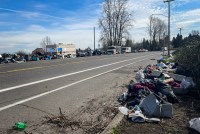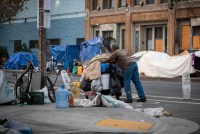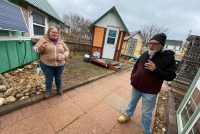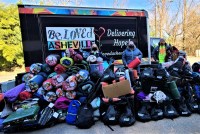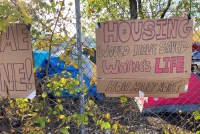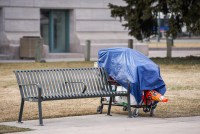Latest KFF Health News Stories
En las grandes ciudades y en los pueblos pequeños, muchas ofrecen ahora servicios para acceder a vivienda, a cupones de alimentos, a la atención médica y, a veces, incluso a duchas o cortes de pelo.
Journalists Reexamine Mental Health Barriers, Gun Control Laws, and Homelessness
KHN and California Healthline staff made the rounds on national and local media this week to discuss their stories. Here’s a collection of their appearances.
El calor extremo puede causar calambres, agotamiento por calor e insolación. El calor extremo contribuyó a la muerte de unas 12,000 personas en Estados Unidos cada año entre 2010 y 2020, según un estudio de la Universidad de Washington. Es probable que esas cifras aumenten.
LA’s First Heat Officer Says Helping Vulnerable Communities Is Key to Achieving Climate Goals
Los Angeles taps Marta Segura, director of the city’s climate emergency mobilization office, as its first heat officer. Segura, the first Hispanic person to hold such a position in the country, will work across city departments on an early warning system while developing cooling strategies.
Sobering Lessons in Untying the Knot of a Homeless Crisis
The homeless tragedy in Portland, Oregon, now spills well beyond the downtown core, creating a crisis of conscience for a fiercely liberal city that has generously invested in homeless support services.
LA Mayoral Hopefuls Agree Addressing Homelessness Is Crucial but Disagree on How
The top candidates to lead California’s most populous city have pledged to expand services for homeless people struggling with mental illness and substance use disorders. But they differ on whether the city should control homeless funding or continue a partnership with the county.
‘I Just Want to Stay in One Spot’: From Homeless to Housed in Rugged Del Norte
California’s homeless crisis is often understood through cities like Los Angeles and San Francisco, where the sheer number of people living unsheltered can quickly capsize the programs designed to help them. But in remote counties like Del Norte, California’s Project Homekey is having a tangible impact.
Casas pequeñas ofrecen más que un techo para las personas sin hogar
Hasta Arnold Schwarzenegger donó dinero para 25 casas pequeñas en Los Angeles. Una solución para las personas sin techo.
How the Tiny-Home Movement Is Providing More Than Just a Roof to Homeless People
Cities and nonprofits across the country are building communities of tiny homes to safely house people amid covid and cold winters. Proponents say tiny homes give people dignity and privacy, but some advocates for homeless people say they don’t go far enough.
California Set to Spend Billions on Curing Homelessness and Caring for ‘Whole Body’ Politic
California is embarking on a five-year experiment to infuse its health insurance program for low-income people with billions of dollars in nonmedical services spanning housing, food delivery and addiction care. Gov. Gavin Newsom said the goal is to improve care for the program’s sickest and costliest members and save money, but will it work?
Voters in Tight Recall Race Sound Off on California Gov. Newsom’s Covid Leadership
Democratic Gov. Gavin Newsom’s pandemic policies are effectively on California’s Sept. 14 recall ballot — and the electorate views them with a mix of resentment, gratitude and disillusionment.
‘Go Ahead and Vote Me Out’: What Other Places Can Learn From Santa Rosa’s Tent City
As cities across California wrestle with a crisis of homelessness that has drawn international condemnation, Santa Rosa’s bold experiment with a city-sanctioned encampment suggests a way forward.
Blue Shield Spent Years Cultivating a Relationship with Newsom. It Got the State Vaccine Contract.
Insurance giant Blue Shield of California has made millions in charitable and political donations to Gov. Gavin Newsom over nearly two decades, largely to his dearly held homeless initiatives. In turn, Newsom has rewarded the insurer with a $15 million no-bid contract to lead the state’s covid vaccination distribution.
Farmworker Camps to Urban Tent Cities: Tailoring Vaccine Info to Where It’s Most Needed
Concerns arising in western North Carolina provide a window into the challenges facing health workers across the country as they seek to persuade vulnerable populations to be inoculated against covid.
Homeless Shelters Grapple With COVID Safety as Cold Creeps In
During the pandemic, shelters are having to change the way they do things to prevent the virus from spreading among the vulnerable homeless population. Now, as winter weather moves in, there’s less room at the shelters for those in need — threatening to leave many, literally, out in the cold.
KHN and California Healthline staff made the rounds on national and local media this week to discuss their stories. Here’s a collection of their appearances.
Hard Lives Made Harder by COVID: Homeless Endure a ‘Slow-Moving Train Wreck’
This was supposed to be the year California finally did something about its homelessness epidemic. COVID-19 upended that promise, along with the cobbled-together services many homeless people rely on for survival. Interviews across the state reveal a new magnitude of hardship and indignity for tens of thousands of people living on the streets.
Listen: Outbreak of Trench Fever Grips Coloradans
KHN senior Colorado correspondent Markian Hawryluk joined KUNC’s Henry Zimmerman on “Colorado Edition” to discuss his recent story on an outbreak of trench fever around Denver.
An Ickier Outbreak: Trench Fever Spread by Lice Is Found in Denver
Three people around Denver have confirmed cases of trench fever, and another person is suspected of having the rare disease, carried by body lice. A scourge during World War I, the illness is the latest problem to emerge as everyone’s attention is diverted to COVID-19.
Coronavirus Crisis Disrupts Treatment For Another Epidemic: Addiction
The coronavirus has forced drug rehabilitation centers to scale back operations or temporarily close, leaving people who have another potentially deadly disease — addiction — with fewer opportunities for help.






